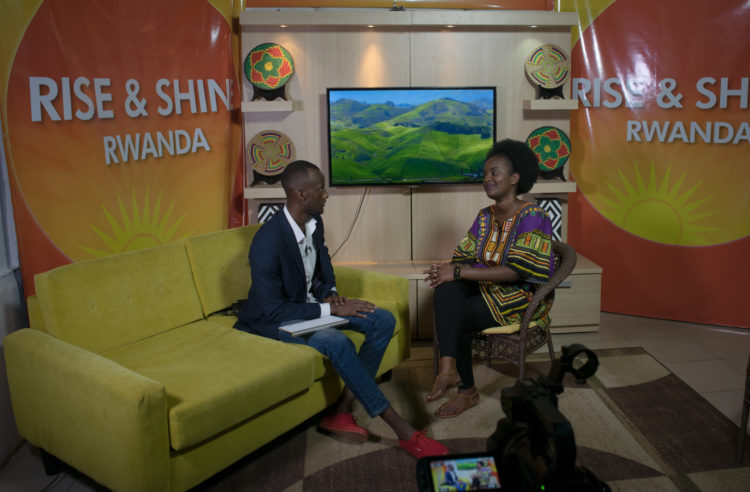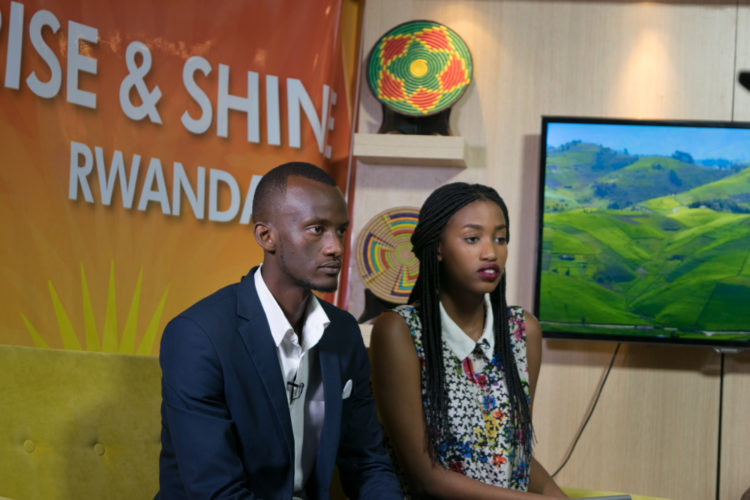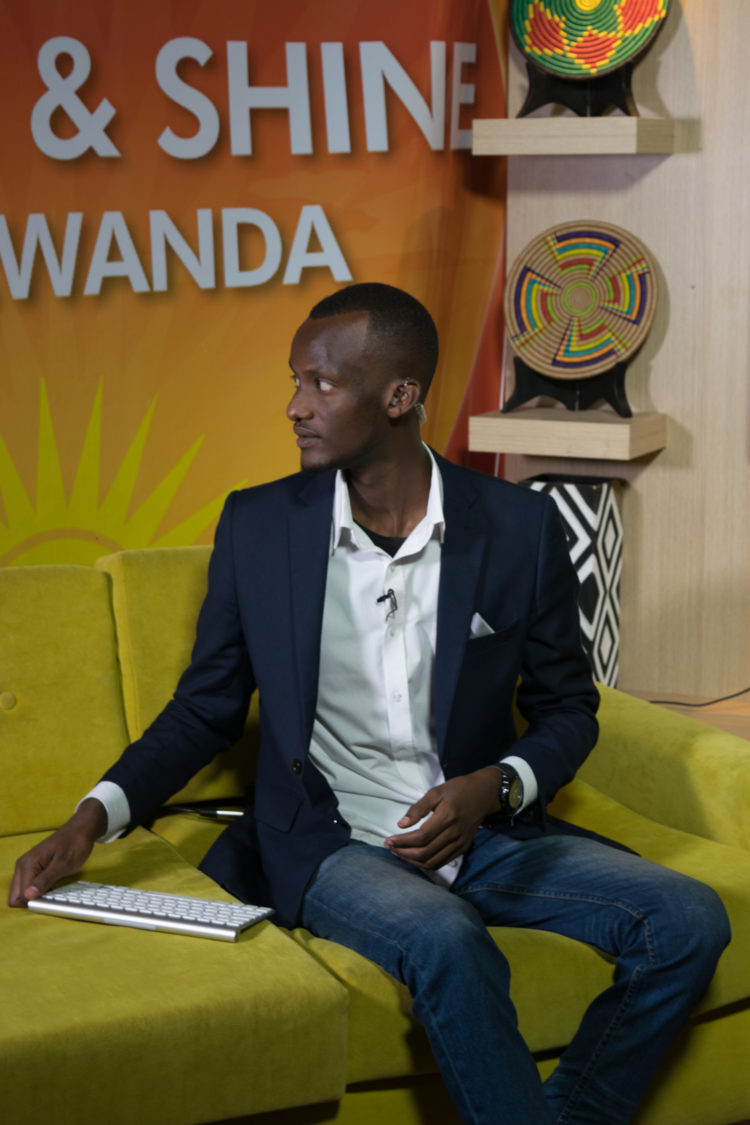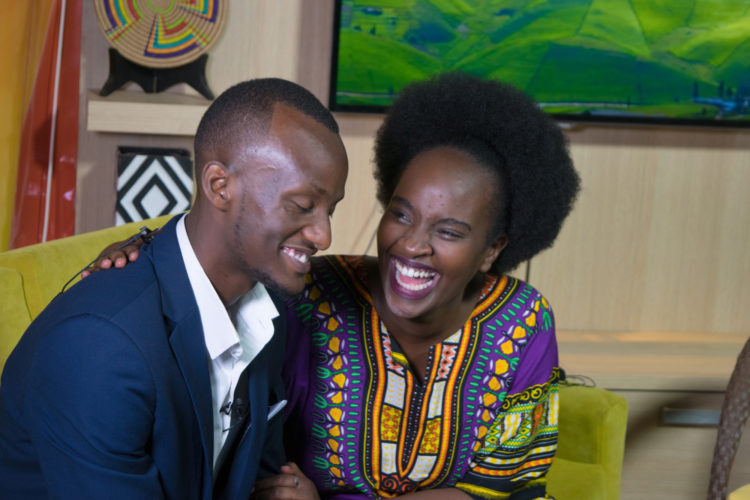Ivan Mwagwene is one of the rising leaders in Rwandan journalism.
Only 22 years old, he’s host of a brand new morning talk show, Rise and Shine Rwanda. After spending the early years of his life in Western Uganda, Ivan moved back to Rwanda for high school. Here, he fell in love with public speaking through a local programme called iDebate.
His talents landed him a spot on Rwanda’s favourite breakfast show. Started in October 2014 by Dianne Dusaidi, Rise and Shine Rwanda covers the latest in business, sports and lifestyle in the country. I got a chance to attend a taping of the show, and chat with its star, Ivan.
Most 22-year-olds aren’t television anchors. Can you tell us how exactly you landed here?
I had just finished high school, and I was trying to find a job like any other high school graduate. When I first saw the opportunity, I decided to go for it anyway. I remember at my interview when my boss asked about my age.
She gave me chance.
I told her I was 21. She then asked if I had any relevant experience. The only relevant experience I had was debate. Oddly enough, she gave me chance anyway. I’ve only been here for a year, but I’ve learned a lot.
What’s the most challenging part about your job?
I’ve never had a formal media background, so I didn’t come into the job with any technical skills. As a member of my high school debate team, I honed my writing and public speaking skills. However, this job requires more than that. Creating a good story requires editing and shooting as well. Learning these skills was quite a challenge initially.
Has your age held you back in anyway?
My age has been a very big issue for me. At some point, I felt as though I was losing my self-confidence. I engage with a lot of people who are older and more qualified than me. It can be very intimidating, especially when they look at you and wonder why hell this young guy is asking them questions.
I’ve gained a lot of experience over the past year.
Sometimes I would go to interviews, and my guests wouldn’t take me seriously because of my age. That’s happened to me before. But I’ve gained a lot of experience over the past year, and feel a lot more confident than before.
So tell us what makes a good story?
You need stories that people will wake up at 7am in the morning to watch. You need stories that are accessible to a broad range of people, regardless of their age or gender. We try to get stories that are engaging, and tackle them from new and exciting angles.
What the most difficult part about finding a good story?
Rwanda has a very conservative culture; people tend to keep to themselves. People here also tend to tell a single story about Rwanda, which is dangerous.
As a journalist, you have to delve a bit deeper.
So sometimes getting people to open up about certain issues is quite a challenge. But as a journalist, you have to delve a bit deeper, and go beyond the border to get to the more pressing issues.
As a journalist, do you ever feel any pressure to represent your country authentically?
I know that I represent a new generation of upcoming journalists in Rwanda, and in Africa. Here, we’ve had an old generation, who are now on their way out. I represent a generation that is willing to get out of their comfort zones, and talk about more pertinent issues. I don’t necessarily feel pressure, but I am aware of the responsibility
What role do you think you have in mobilising the youth in Rwanda?
Our team is very vibrant and young. And I think this has opened up and changed the perceptions that many harbor about young people. I’ve challenged my friends and colleagues to see that young people can do incredible things.
Most people here think you need to be like 27 or something. But that’s not true. You can start doing something when you’re still young; and you can be good at it. There are many opportunities for young people here, and it’s high time that we start taking advantage of them.
So would you say there are enough opportunities for young people?
Yes. If you go around town, you can see that young people are dominating. Look at the tech world here. That’s young people. Entrepreneurs? Young people. Media? Young People. Because of our history, most of our population is youthful.
Rwanda is the country of 1,000 opportunities.
So we have a lot of eager young minds ready to occupy opportunities. They like to say Rwanda is the country of 1,000 opportunities. But as a country that’s still reconstructing itself, we need to make sure that young people continue to be trailblazers.
Rwanda has opened up to world over the past several years. What role do you envision Rise and Shine playing in a more globalised Rwanda?
We have a vibrant and young team. But we are presenting stories differently. We’re open to dissenting and varied opinions. As a privately-owned programme, we have the flexibility to talk about certain issues that other shows simply cannot.
We’re also somewhat of a private media pioneer in Rwanda. Many people don’t pursue private media because they don’t believe it’s profitable. We’re trying to change that. Rwanda has successfully made the digital migration. But what we need now is original content. That’s what we do at Rise and Shine Rwanda. Hopefully others will see our efforts and follow suit.
Where do you see the show in five years?
We’re now occupying the online industry here in Rwanda. We’re venturing into that aggressively. We want to be the leaders in online content in the next few years . Online is the future, so we must advantage of that. As an English programme, we don’t have many competitors. We actually have a lot of Rwandans in the diaspora who tune in to get a sense of what’s happening back home. We’re essentially the first ever morning breakfast shows on Rwandan TV. No one is doing what we do.
Who do you look up to?
I look up to people like Christiane Amanpour, Fareed Zakaria. Also some Africans like Julie Gichuru. She’s doing great work in Kenya. There are lots of South Africans doing a great job at MTV Base; I look to them as well. I also look up to Mehdi Hasan on Al Jazeera’s UpFront; he does a great job of tackling tough issues. BBC Africa has always been a favourite. Lerato Mbele is excellent. Kola Dumor, who passed away not too long ago, is also an idol of mine.
Where do you see yourself in five years? What are your goals?
I just want to go on and acquire more professional skills. I would like to stay in broadcasting. I want to tell the African story. You know, Africans haven’t had the opportunity to tell their own story. I want to change that. I also want to make sure that I am serving as a mentor for those who will come after me.
I’m trying my best to take advantage of these opportunities.
I’ve offered friends summer internships. I’ve even invited some friends to our studio, and shown them around. I want to continue giving back. Being a journalist has given me exposure and connections. I’m trying my best to take advantage of these opportunities, while giving back at the same time.
Check out more on the Rise and Shine Rwanda‘s YouTube channel here




